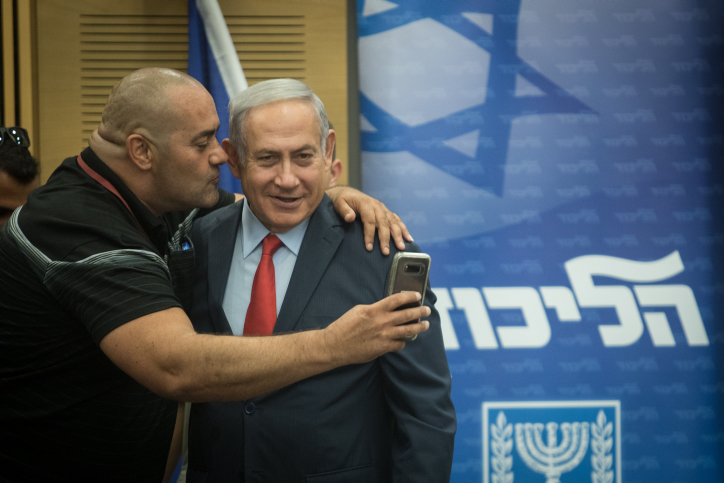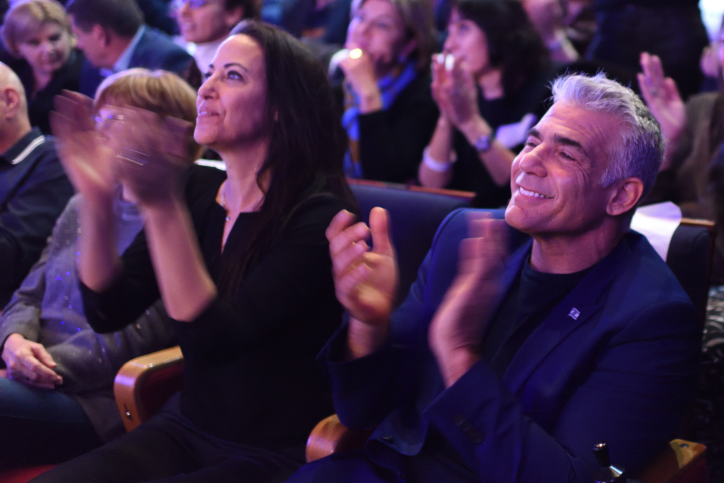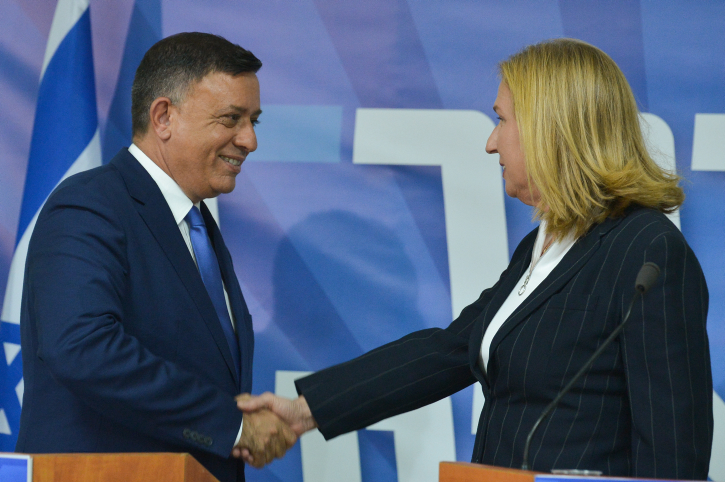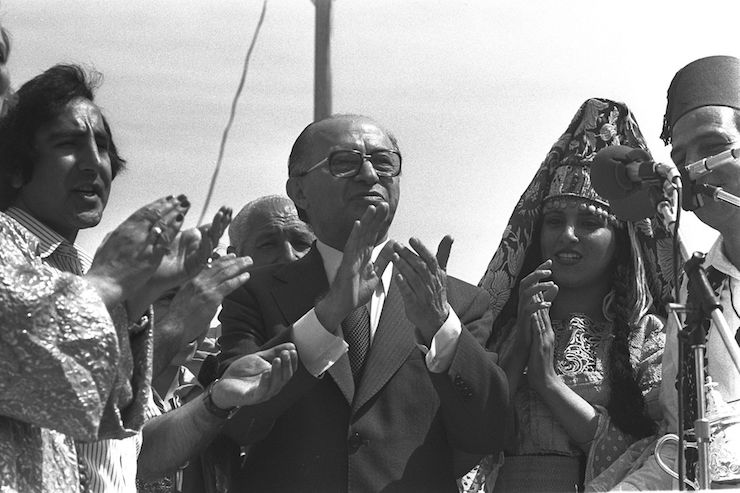Although Israelis have historically voted for strong political frontmen, it seems that dazzling personalities are no longer sufficient to winning elections. It turns out that voters are looking at the values, worldview, and policies.

Last October, Lior Shlein, Israel’s top satirist, made a convincing case that Yair Lapid is a cult leader. Lapid was a TV celeb who entered politics in 2013 trading on his teeny-bop looks and name recognition. He had no discernible ideology other than a vague promise to represent the mostly middle classes behind the social protest of 2011. Yet despite his own tony demographic, his Yesh Atid party ended up winning 19 seats in his first run. Shlein had a good time comparing Lapid to Jonestown cult leader Jim Jones.
Lapid could be proof that when it comes to election campaigns, Israel has completely gone American: personality takes all. He might represent the end of a process that arguably began with Netanyahu himself. But a deeper look at the complex interaction of people, parties, and issues on the agenda shows that voters aren’t as cynical, shallow, or prone to manipulation as we think.
The idea that campaigns are merely a personality contest carries a deep stigma of campaigns as empty manipulation. In this view, all it takes to sell a leader is a slick adviser, the right hair, makeup, height, and some ready-mix rhetoric. Hope, change or unity will do. Or the flip side, fear.
In the 1990s, Netanyahu was considered the ultimate personality candidate. When he first entered politics, he was criticized for being too “American,” as recalled in the excellent new documentary film King Bibi. Netanyahu had clever timing for a charisma-candidate; Israel had just changed its electoral system and in 1996 held direct elections for prime minister for the first time in its history. The horserace threw a spotlight on the now-famous televised debate between Netanyahu and incumbent Shimon Peres. Like the Nixon-Kennedy debates of 1960, Netanyahu was nimble and sharp, all butterfly and bee around his older, slower opponent. He ended up winning.

Dr. Israel Waismel-Manor, director of the Department of Government and Political Thought at the University of Haifa and an expert on political campaigns, agrees that Israel is moving toward personality politics and away from a focus on either ideology or institutions, in both campaigns and the media. According to Waismel-Manor, this is a global trend. “It’s hard to cover institutions in the media,” he explains. “It’s hard to cover Congress, easier to cover Nancy Pelosi.” The same is true for Israel.
The deeper explanation, Waismel-Manor believes, is historic. Israel is in a much stronger material position, both economically and militarily, compared to the past. “We’re living OK, we fly abroad once a year,” he says, and again, not only in Israel. “It’s not like we’re dealing with World War II, Vietnam, or the great poverty of the past.” As a result, ideology is fading and parties no longer represent such polarized world views.
“There’s not much difference between the security and diplomatic vision of Benjamin Netanyahu, Benny Gantz, Lapid, and Avi Gabbay. Everyone wants a peace process with minimal compromise, whether it’s on 60 percent of 95 percent of the territory,” he says.

Voters and even politicians have an easier time switching parties.With less party loyalty, the voters are more focused on personalities.
Waismel-Manor pointed out that the Likud primary held this past Tuesday was the best example of a fierce “competition among people who all fundamentally agree.”
Indeed, primary day was a melee of personality gimmicks. Tourism Minister Yariv Levin brought in clowns on stilts, Oren Hazan recruited people to wander around dressed as his double, Yoav Kisch set up a life-size cutout at his booth for selfie purposes. The secular former mayor of Jerusalem, Nir Barkat, began his day at the Western Wall. Politicians and commentators alike repeatedly lauded the proceedings as a festival of democracy.
Does the Likud primary represent a dystopian extreme in which politics are purely about people whose political program is so standardized they might as well be cloned?

It’s not that simple. Israel dropped the direct election for prime minister after three cycles; since 2003 voters elect only a party, which means the latter still have a powerful role.
This holds mostly for the traditional parties that have been around for at least a generation. My friend Omri, a 39-year old father of two who works in the television industry, usually votes for the left-wing Meretz party. Like many, he tells me he hasn’t quite decided how to vote in April. If he does support Meretz again, it won’t be due to new party leader, Tamar Zandberg. Omri cheerfully observes that he has never really liked the leaders of the party.
Despite that, he has voted Meretz nearly every time, breaking ranks only once to support insurgent Labor Party leader Amir Peretz in 2006. Today, he says, the main reason to support Meretz would be to make sure the party crosses the electoral threshold and enters the Knesset.
Maybe party-based voting is as shallow as cults of personality; based on tribalism, or automatic, uncritical loyalty. Waismel-Manor, the political scientist, recalls a joke: “If Yasser Arafat was the leader of Likud, the party would still win,” and he believes that should Arafat be replaced by Hamas leader Ismail Haniya, the principle would still hold. “These are people who hear the Likud jingle and get goosebumps.”
The Labor Party, too, has such a following. The party’s fortunes have tanked since outsider Avi Gabbay won the primary leadership contest in July 2017, even before he unceremoniously tossed out his political partner Tzipi Livni and left each party polling alone. After the new centrist challenger Benny Gantz gave his debut speech, one poll showed Labor winning just five seats, barely over the four-seat minimum — its worst poll to date.

But Roby Nathanson, founder and director of the Macro Institute for Political Economics and a long-time Labor supporter, is still considering voting for the party, for a different reason. “I want to vote Labor not because of the leader but because I want a number of Labor people in the Knesset. [Itzik] Shmuli, Stav [Shafir], Michal Biran — the young people are very high quality.”
“The list,” as people commonly refer to party candidates in Israel, cuts into the simplistic question of party versus personality. The candidates often have less star-power prior to entering politics, and voters associate them primarily with a specific issue they represent while in office.
Nathanson observes that the three MKs he named have advanced important social issues such as public transparency, issues relating to elderly Israelis, and labor relations. Karin Elharar of Yesh Atid observed that supporters particularly appreciated her party members who served as health minister and education minister in the previous government for their work in those fields. The list isn’t just personality, it could be a bridge to issues — substance.
Yet the bottom line remains that a change of government will only happen in Israel if Likud’s power declines, and it is the party with the largest, traditional family of voters. So how many are stalwart party supporters regardless of the leader, and how many are Netanyahu followers? Surely they cannot totally be separated, but Waismel-Manor proposes that the party base — let’s call them the goosebump voters — are worth around 12 Knesset seats. This was the number Likud won in 2006 after legendary leader Ariel Sharon broke away and formed Kadima. Waismel-Manor surmises that anyone who remained with Likud was a party devotee.
The distinction, even if murky, is valuable for considering what might happen if Netanyahu falls, whether due to legal troubles or because he has simply lost popularity within his own party. The danger of cleaving mainly to a person is that one slip-up can be a tipping point. Dr. Hadas Cohen, a political scientist at Hebrew University specializing in identity politics, observed how angry some Netanyahu supporters were at Netanyahu for an incident in October. In a public event in the northern city of Kiryat Shmona, a woman heckled him in protest over the closing of a local hospital’s emergency room. Netanyahu responded, cameras rolling: “You don’t interest us. You bore us.” Cohen says she has spoken to many people who now say “‘no more.’”
Diving further into the complex relationship between voter, party, and leader, Cohen recalls that in the 1970s, many marginalized Mizrahim (Jews from Muslim or Arab countries) felt “recognized” by Likud after decades of neglect or injury by the ruling Labor party elite. At the time, Likud leader Menachem Begin may have set off an early-stage personality contest not so much due to modern image-making, but rooted in a sense of benevolent patronage, where the payback for votes was symbolic rather than material.

This could explain a problem American analysts also struggle to explain: why do certain lower economic classes vote for parties that fail to improve their material conditions. Certainly by the 1990s, Likud’s stark neoliberalism and state cutbacks, specifically under Netanyahu, hardly helped Israel’s lower classes. But those same people apparently continue to feel recognized and legitimized by Likud. Should Netanyahu make them feel abandoned, could they potentially fall away?
One longtime Likud voter, Ohad Ouziel, is considering leaving Likud to vote Gantz. A 48-year-old writer who lives in Tel Aviv, Ouziel’s family represents a range of right-wing views. Gantz’s campaign would be thrilled to know that a longtime Likud voter is considering defecting to the former IDF chief of staff. Ouziel says that two recent additions to Gantz’s list (via the merger with former defense minister Moshe Ya’alon) are people who represent his ideology very well. Netanyahu has been a perfectly good leader in Ouziel’s eyes, but holds no mystique. Whether he ultimately stays with Likud or moves to Gantz, it seems ideology is the driving factor, in the form of personalities on the list — not for Gantz’ image, nor against Netanyahu.
Omri, the Meretz voter who is currently undecided, also thinks of values rather than the party leaders who leave him indifferent. “I insist on my naive worldview,” he says. That includes a big government and social-democracy approach by contrast to “Netanyahu’s capitalism & privatization.”
To be sure, Israelis view a number of parties primarily in terms of the personality of the leader, including Lapid, Moshe Kahlon, Tzipi Livni, and the New Right of Naftali Bennett and Ayelet Shaked. All are relatively new parties, and the main source of their support — almost by definition — is for the individuals who founded them. But it would be wrong to say that people fail to distinguish between the ideology of Tzipi Livni versus Bennett and Shaked.
Furthermore, each seems to have an upper limit: after his first big win with 19 seats in 2013, Lapid got only 11 seats in 2015; and though his numbers soared to the mid-20s at points over the last few years, his supporters showed little loyalty once Gantz entered the scene. Kahlon is polling lower than his current Knesset strength and Livni has fallen below the parliamentary threshold in recent surveys.
Ultimately, it seems that a dazzling personality isn’t sufficient to win elections. Parties still matter, and not only due to inertia. It turns out that voters are looking at the values, worldview, and policies. Candidates would be well advised to have some.

